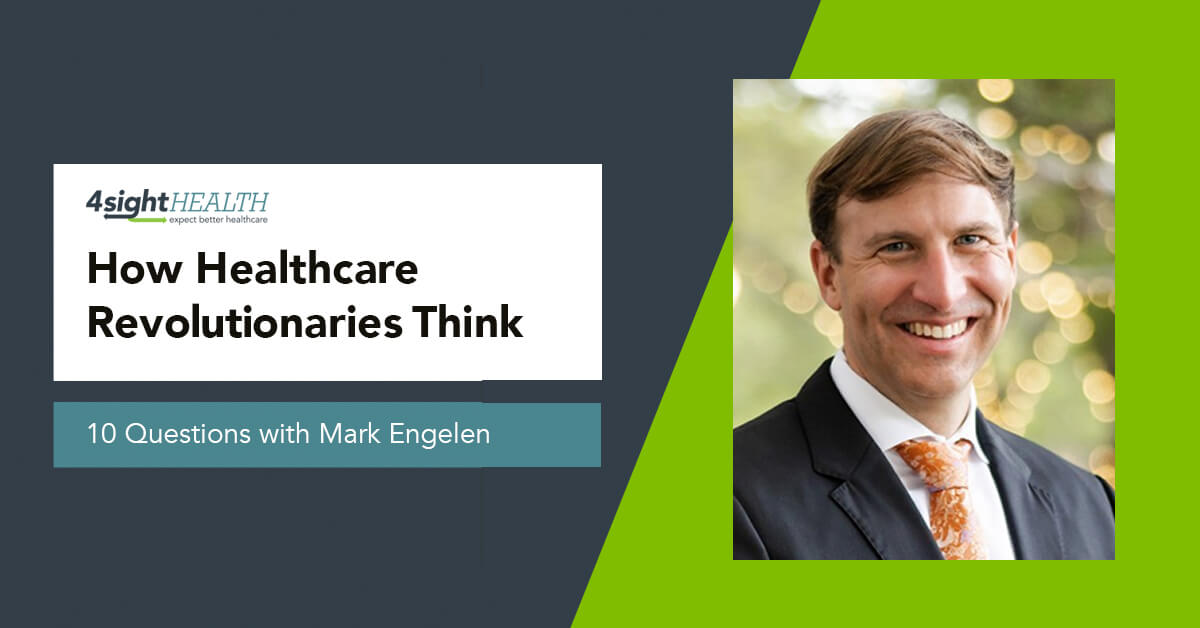April 23, 2024

How Healthcare Revolutionaries Think: 10 Questions with Mark Engelen
Welcome to the latest installment of 4sight Health’s series, How Healthcare Revolutionaries Think. Our interview series profiles healthcare instigators who believe that outcomes matter, customers count and value rules.
When’s the last time you met with your pharmacist individually or as part of a care team to review your prescription medications and your medication adherence behaviors? I thought so.
That’s the gap in patient care that Mark Engelen wants to fill with clinical pharmacists through RxLive, a company he and his wife, Kristen, founded in 2017. RxLive offers a virtual platform through which clinical pharmacists — pharmacists who don’t fill and dispense prescription drugs — become an integral part of a patient’s care team. Clinical pharmacists work with other clinicians to manage the medication portion of a patient’s overall prevention, wellness or treatment plan.
I talked with Engelen, who is CEO of RxLive, about the challenges facing healthcare entrepreneurs, lessons learned from massive vertical integration in healthcare and working with your spouse as co-founder and business partner. You also can listen to my podcast interview with Engelen on why doctors don’t like pharmacists and why my medication adherence is linked to a discount grocery coupon.
1. Mark, how would you define a healthcare revolutionary? It’s how we start each of these interviews.
Engelen: I sat down recently with a sophisticated healthcare insider. They talked about the three stages of healthcare businesses. Stage one is: “I want to improve outcomes for patients.” Stage two is: “I want to make the system better.” Stage three is waving the white flag and saying: “Fine, I’ll just help people make more money.” That’s the three stages of the healthcare entrepreneur.
The healthcare revolutionary is the innovator who can somehow manage all three. They find a way in today’s convoluted healthcare system to make people more money but in a way that makes the system better and helps patients all at the same time. This might sound trite, but this concept of no margin, no mission is absolutely true. Revolutionaries are the ones who can weave their way through this complex regulatory pathway and find a way to create economic value at the same time as creating clinical value.
2. Who do you know, past or present, who fits that mold?
Engelen: As I think about all the people that I’ve engaged in my career, and I’ve been in healthcare my entire career, one of my absolute favorites is a small medical practice based in Orchard Park, New York, near Buffalo. It’s called Inspired Health Group. A husband-and-wife team, Rob and Jennifer Erickson, run the practice. Both are DOs (Doctor of Osteopathic Medicine). Rob Erickson is a very sophisticated physician. He used to run a large independent practice association (IPA) and he’s been in managed care physician leadership. But they exited big medicine and built a small practice that was exclusively focused on the way that they wanted to practice value-based medicine.
One thing I love about them is that they choose to deploy the same programming tools, infrastructure and investment across everybody in their practice. They don’t fall into this trap of providing one for Medicare Advantage and one for traditional Medicare and one for Medicaid. They’ve built a successful practice business-wise but also a high-performing practice from a value-based care standpoint. They’re always at the top in terms of their class and cohort, and all of their quality measures, all of their cost of care measures. Understanding that delivering the best possible care to everybody regardless of the unit economics is really important and, to me, is really revolutionary.
3. This may be the toughest question, Mark, but do you consider yourself a healthcare revolutionary?
Engelen: We’re aspiring to be revolutionaries. We have a vision. Ours is around pharmacy. We look at the world and think, “The level of influence and role that medications play in healthcare is growing. The level of cost and spend associated with medications is growing.” We see pharmacy as a strategic, willing and passionate labor pool able to jump into the breach and help manage patient care delivery. That vision is bold and revolutionary. But as I mentioned from an entrepreneur’s perspective, we need to demonstrate that. How can that happen at scale? What are the viable business models around building that at scale? How can this achieve the entrepreneurial triple aim of making people money, improving the healthcare delivery system and improving outcomes?
4. Do you ever see yourself saying, “Hey, I made it. I’m a healthcare revolutionary,” and kicking back in the La-Z-Boy?
Engelen: No. The work certainly is never done, despite the well-intended and noble missions everyone in this field has.
5. You have a background in chemistry and economics. But I don’t see anything about pharmacy or healthcare. What happened?
Engelen: I double majored in analytical chemistry and economics. Coming out of undergrad, I got offered an opportunity to join a prestigious Ph.D. program at the University of North Carolina. I thought long and hard about it. But at the end of the day, while I enjoyed the data and the experimental side of chemistry and pushing the edge of science, I always had a passion for business. I believe firmly in the noble mission of business that we just talked about. Done well, business is an incredible change agent for good. Done poorly, it’s an incredible change agent for bad.
I was trained as a data scientist, and my first job out of undergrad was going to work for a public health economics think-tank. I did public health policy econometrics and my focus at the time was the role of tobacco control policies. I also did some work on illicit drug policies. That started my foray into thinking and being really passionate about healthcare.
6. Let’s talk more about your work history. You worked for Acredo Healthcare. Medco buys Acredo. Express Scripts buys Medco. Then Cigna buys Express Scripts. You didn’t stay on that acquisition ride the whole time. But did watch it unfold. How did it affect the way you think about healthcare?
Engelen: “Am I going to have a job?” is probably the first thing you think about. I don’t quite know what to think about that series of events. I was fortunate enough to go to Harvard Business School. One of the core courses that they teach there is on disruptive innovation, which is the concept developed by the esteemed professor, Clay Christensen, who wrote The Innovator’s Dilemma. And they talk about the fact that, and I’m paraphrasing here as there’s more complexity to this, but very complex problems require deeply vertically integrated companies and solutions to solve them. The more commoditized a market gets, the more you sort of fractionalize different pieces and parts of that out to factories, and you can commoditize the core components to that.
So, in one sense, I’m not surprised about the series of acquisitions you described. Healthcare, pharmacy management, value-based care, insurance models all are deeply complicated, deeply interconnected. I do think it takes some measure of vertical integration to make them work.
On the other hand, given how interwoven those systems are, and how hard they are to move, injecting innovation into them certainly is challenging. For healthcare systems at large, is vertical integration of this magnitude right for what we want to achieve? I don’t know. I think the jury is still out. But, as I said, innovation in these types of behemoth systems is much more challenging.
7. Let’s play a word association. I’ll say a word or phrase, and you tell me what immediately comes to mind. Ready? Practice at the top of your license.
Engelen: Practice at the top of your license. It’s actually core to our thesis here at RxLive. We have an army of clinical pharmacists with the right skill set to understand complex medication management. But from a regulatory and a reimbursement perspective, there are few pathways to get paid for that. We’re innovating across that dimension today in our business model. CMS [Centers for Medicare and Medicaid Services] has come a long way in terms of expanding the role of pharmacists as clinical staff who can use some of the care management service and billing codes that are out there. This is our big thesis. How do we activate pharmacists out of traditional dispensing-only roles to be more forward in clinical roles? How do we stretch the boundaries of what physicians are comfortable with? Maybe offloading is not the right word but partnering with pharmacists is. Regulatorily, we’ve seen an explosion in this type of scope-of-practice growth for pharmacists over the past three or four years.
8. You said my next phrase for word association. Scope of practice.
Engelen: Everybody perceives scope of practice as a threat. I want to reframe it as an opportunity. We sat down and talked to the physicians at Inspired Health Group. We asked them, “What do you not want to do? Where do you think your time is wasted? Where do you think your time is better spent?” Many areas emerged. One was complex diabetes management. Medication titration is a big part of the course of care for that particular patient. Does the physician have to be spending all of their time doing that or can they, under appropriately set boundaries, collaborate with a clinical pharmacist? The vast majority of medication non-adherence challenges are behavioral. Many physicians would be like, “Yeah, maybe I’m not the best person to be spending 30-plus minutes with a patient, unpacking the behavioral nuances of why they’re deliberately not taking their medication.”
That’s just one of many examples. Scope of practice is a much more nuanced dynamic than just, “Hey, you’re taking food off my table.” Look at the number of physicians exiting the workforce. That’s going to be a challenge just in terms of capacity. So, I hesitate to say it’s shortsighted, but it’s shortsighted.
9. Your target clients for RxLive are hospitals, health systems, medical practices, employers and payers. That’s a pretty broad spectrum of the industry. Who’s not on the list and why?
Engelen: An area that we have danced around is obviously manufacturers, pharma and biotech. They aren’t on the list today. We’re not a dispensing pharmacy for a specific reason, which is, we never want to be in a position in which our recommendations are driven by financial motivation, right? Where we would be hurt financially by prescribing or deprescribing a medication. It’s something we feel strongly about. The profit motive of an incremental dispense when it may or may not be clinically appropriate is something we never want to feel. Lots to unpack there, clearly.
10. As we like to say in Chicago, albeit not often enough is, you run a clean game. Speaking of conflict avoidance, let me ask you about this. You co-founded RxLive with your wife, Kristen, who is a clinical pharmacist. Kristen is also the Chief Pharmacy Officer of RxLive. You’re the CEO. Who’s more likely to wake up in the middle of the night, wake the other person up, and say, “I’ve got a great idea!”?
Engelen: With the stress of running a business, taking care of patients and raising a 7-year-old and an 11-year-old, I would be murdered if I woke Kristen up in the middle of the night because I had a bright idea. I’m more likely to wake up in the middle of the night. I don’t sleep well since I became an entrepreneur, period. But I know better than to wake her up.
Burda’s Final Bit
I take five prescription medications. Two prescribed by my primary care physician (PCP). Two prescribed by my cardiologist. And one prescribed by my neurologist. I take five over-the-counter medications. One recommended by my former PCP. One recommended by my ear-nose-throat doctor. One recommended by my gastroenterologist. And two recommended by my wife, who is a nurse.
None of those people are pharmacists, and no pharmacist has ever met with me to go over everything I’m taking when I wake up in the morning, midday after lunch and before I go to bed at night.
I’m exactly the person Mark Engelen can help with RxLive. Why my insurer, in-network medical practice or in-network hospital don’t have a clinical pharmacist on my care team was a mystery until I spoke with Engelen. Now I know the answer. It’s about business. How about making it your business to keep me and others like me as healthy and safe as possible with better medication management?
Mark Engelen is CEO of RxLive and working toward integrating pharmacists into existing care delivery models, and streamlining traditional practice with technology. As a healthcare revolutionary, he is trying to help healthcare organizations create value, cost savings, and generate revenue through clinical pharmacy.
Read more interviews with healthcare revolutionaries
Healthcare Revolutionary Chris Johnson
Healthcare Revolutionary Ramona Wallace, D.O.
Healthcare Revolutionary Alejandro Quiroga, M.D.
Healthcare Revolutionary Samir Goel
Healthcare Revolutionary Marcus Whitney
Healthcare Revolutionary Demi Radeva
Healthcare Revolutionary Michael Pitt, M.D.
Healthcare Revolutionary Rebeckah Orton
Healthcare Revolutionary Dan Trigub
Healthcare Revolutionary Bruce Brandes
Healthcare Revolutionary Lena Chaihorsky
Healthcare Revolutionary David Nash, M.D.
Healthcare Revolutionary Esther Dyson
Healthcare Revolutionary Meghan Conroy
See if your favorites are included in the series and let 4sight Health’s David Burda know who you consider to be a Healthcare Revolutionary.





